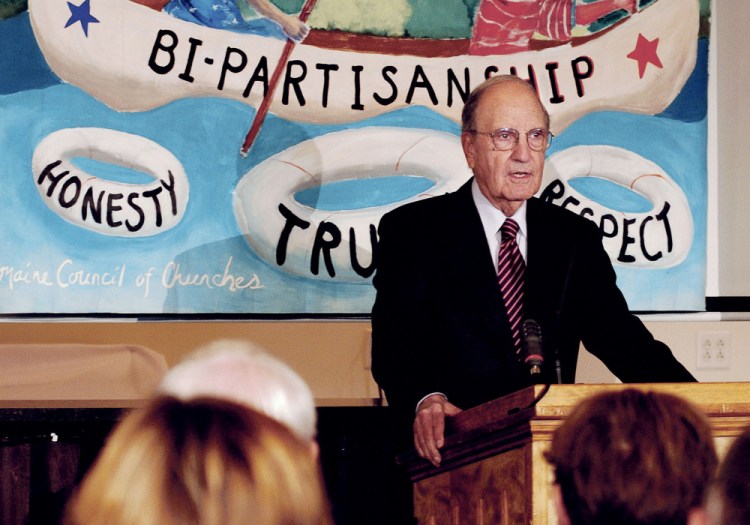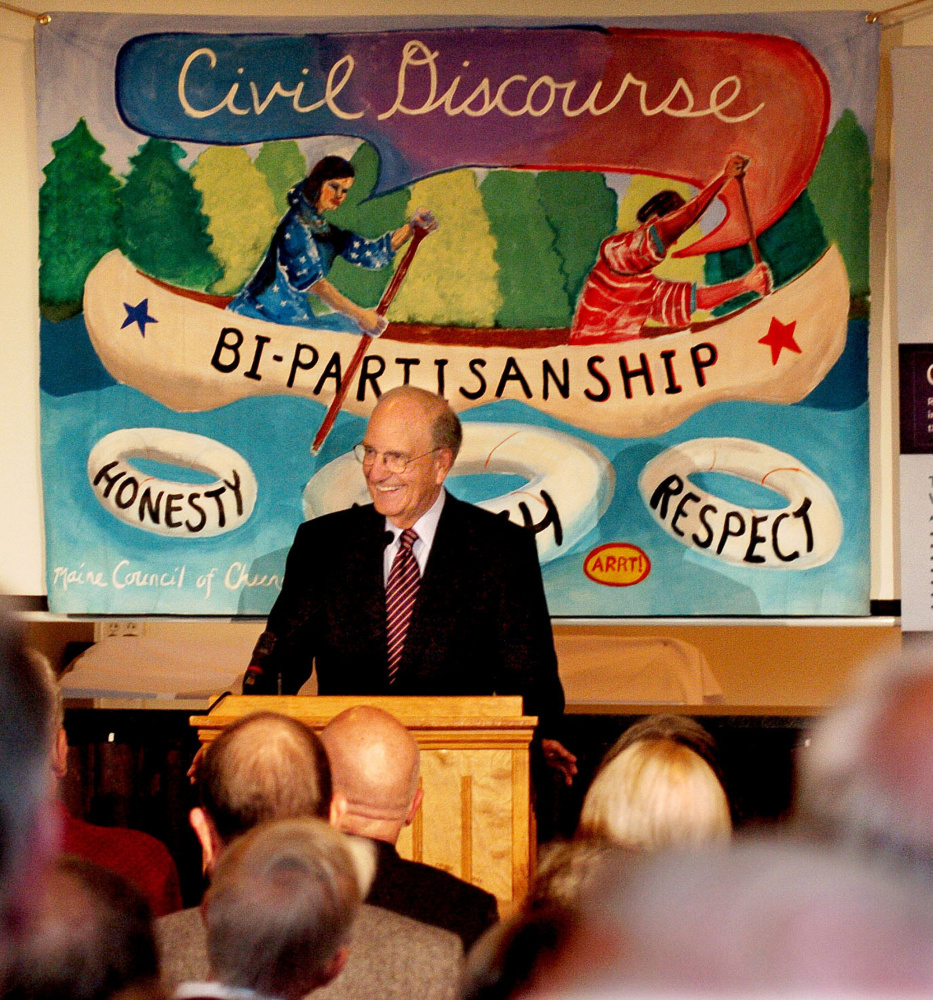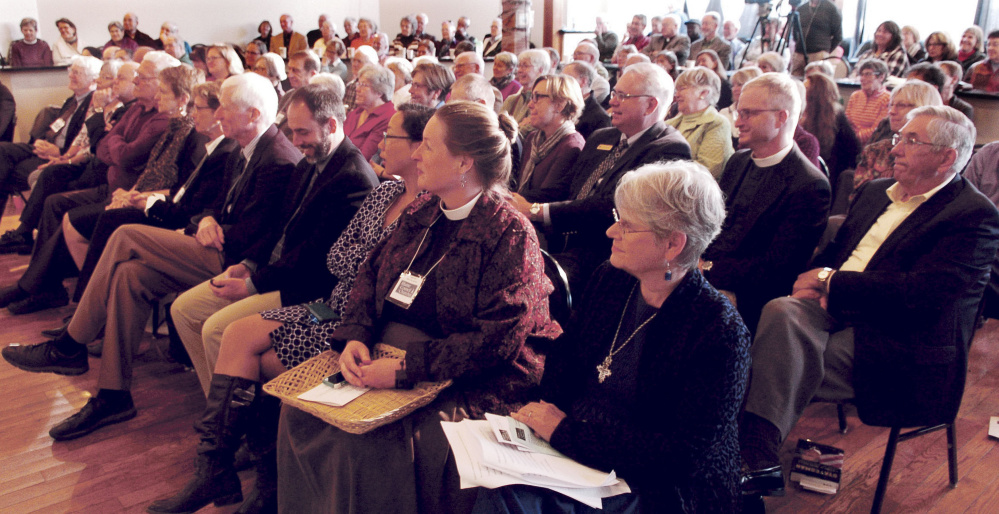WATERVILLE — Politics in the U.S. have always been divisive, but nothing like what is happening now, with candidates attacking one another with verbal insults and profanity, according to former U.S. Sen. George J. Mitchell.
Years ago such attacks were seen mostly in newspapers, he said, whereas now they are repeated endlessly on cable networks and social media and the effect is deeper, longer lasting and more negative.
Mitchell, a Waterville native and former U.S. Senate majority leader, pointed to those polarizing changes and said that practice must stop.
Mitchell spoke Thursday morning to about 200 people from around the state and beyond who turned out for a special breakfast at the Best Western hotel hosted by the Maine Council of Churches. He talked about how to help make politics more civil and what people can do to further that goal.
The former U.S. District Court judge, who also helped negotiate peace in Northern Island and was a special U.S. envoy to the Middle East peace talks, said insulting and threatening those who disagree is often a way to obscure the truth and avoid serious discussion, not engage in it.
“Every citizen of Maine and every other state in the country can play a role in reversing those hateful trends,” he said.
It is important, he said, that people speak out against such practices and contribute their time, efforts and money to effect change. “We can vote,” he said. “It is through the ballot box that we not only can choose our public officials, but we can show our values as a nation.”
Mitchell’s comments Thursday came the same day that a new Colby College-Boston Globe poll found most Americans — 90 percent — believe civility in politics is important, while 70 percent said the U.S. may lose its global prestige because of the uncivil tone of the 2016 election.
“It seems most Americans view the election as particularly nasty,” Daniel Shea, professor of government and director of the Goldfarb Center for Public Affairs at Colby, said in a news release about the poll, which was conducted by SurveyUSA. “They know the world is watching — and that it doesn’t shine a nice light on our democracy.”
Although Mitchell on Thursday did not identify Donald Trump and Hillary Clinton by name during his talk — the candidates exchanged harsh words during their final presidential debate Wednesday night, and Trump wouldn’t commit to accepting the election’s outcome — Mitchell clearly was referring at times to the presidential race and has said publicly that he supports Clinton for president.
Mitchell, a Democrat, told a story about how he and Republican Sen. Robert Dole, of Kansas, worked together in the U.S. Senate, often disagreeing on issues but finding ways to compromise. Mitchell was Senate majority leader; Dole was the minority leader who later became the Republican nominee for president.
Believing neither man could do his job if their relationship was one of distrust, Mitchell promised Dole at the outset that he would never criticize or surprise him and always would respect him and keep his word. Dole was delighted, according to Mitchell.
“We shook hands and never, ever has a harsh word passed between us,” Mitchell said. “We debated vigorously, but we did not make it personal.”
Their debates focused on issues, not personal attacks, with both recognizing that they had an obligation to the senators who elected them to be their leaders, but also — and more importantly — to the people who elected them, he said. Too many people demonize their opponents, according to Mitchell.
LIVING THE DREAM
Mitchell on Thursday focused primarily on the need to promote civil discourse and hold officials and candidates accountable for their speech and behavior, but he also touched on the topics of immigration and climate change.
People in the U.S. are fortunate to be citizens in a free and open country that is one of the most just societies in the world, according to Mitchell. And while its military is strong and the U.S. is the most dominant power, it faces challenges, both at home and abroad, he said, adding that Americans are fearful and anxious.
Wealth is not distributed fairly throughout the country, nor is economic growth evenly spread, according to Mitchell. While some areas of the country are struggling, others are thriving.
“We have to have the unity of our people. We have to have a national purpose. We have to have a national commitment to make good health, education and jobs available to all Americans,” he said.
During the first century of America’s existence, the country welcomed immigrants; but later, Jews, Italians, Irish, Catholics and others became the target of hostility and hatred, racial and religious discrimination and stereotyping, according to Mitchell.
He said every rational American knows the country can’t accept everyone who wants to live here and the U.S. needs policies that place fair and realistic limits on how many people, and who, can enter. But the national debate has focused, he said, on who cannot enter and why, and how best to keep them out.
Instead, the focus should be on who we want to enter the country and how the country can benefit those people, as well as the U.S., he said.
Citing the companies Apple, Amazon and Google, whose owners were either immigrants or children of immigrants, Mitchell said the U.S. has been enriched by immigrants. He asked if the U.S. would be a better country today if they had not been admitted into the country.
“Genius knows no language, no race, no religion,” he said.
Mitchell also had spoken Wednesday night in Falmouth. He said Thursday that a man at that event approached him afterward to say he had left something out of his speech.
“He pointed out that Americans have received several Nobel prizes this year, and each of them is an immigrant to our country.”
Mitchell talked about growing up in a “slum” at Head of Falls in Waterville, where initially residents were mostly French-Canadian, but later there were also Irish and Lebanese. Most were uneducated, he said. His mother, a Lebanese immigrant, could neither read nor write and worked in a textile mill; his father, who was Irish, did menial jobs, working the last 20 years as a janitor. Because of their efforts and the openness of American society, however, their youngest son, George, got an education, he said.
“I believe in the American dream because I have lived it,” Mitchell said.
CHANGING CLIMATE
After his speech, which drew a standing ovation, Bonny Rodden, president of the Council of Churches’ board of directors, took questions for Mitchell from the audience. One question was about what leaders in the faith community can do to help reverse negative trends.
Mitchell said that in one major way, society has not progressed because a child in Maine — in Waterville — has less of a chance for upward mobility than Mitchell had when he was young.
“I think that is not only a tragedy for these individuals; it is a loss for society,” he said.
He said people have a responsibility to ensure everyone has the same chance for success. His goal, and one that keeps him going every day, is to make sure every child in Maine is able to get a college education. Through his scholarship fund, he has given away millions of dollars in scholarships to graduating high school seniors.
“If I work every day of my life toward that goal, I think I can do a lot of good.”
He emphasized the need to for people to ensure children are fed properly and given early intellectual stimulation.
Mitchell said a topic conspicuously absent from the three presidential debates was what he considers one of the most serious problems confronting the world — climate change and global warming. Initially, 17 Republican candidates were seeking the presidency.
“All 17 of them denied the existence of climate change and opposed any effort to do something about it, and I find that shocking,” he said.
Without naming Trump, he cited one candidate who believes climate change is a hoax invented by the Chinese.
“I find that an incredible statement,” Mitchell said, adding that the evidence is overwhelming that climate change exists and it is critical that action be taken to address it, as no society will succeed if it denies science.
“There once was a time when many people believed Earth was flat,” he said. “There was a time many people believed the sun revolved around the Earth. We know now those were not the case, and the reality of science has become what we consider knowledge.”
He added: “This is not just a question of individual belief. People can believe whatever they want. This is a question of national survival.”
Peter Garrett, 72, of Winslow, said he had planned to ask Mitchell about climate change, but Mitchell beat him to the punch. Garrett said he was impressed with Mitchell’s comments on not only climate change, but on other issues.
“He’s an example of somebody who came from humble beginnings and just kept on, didn’t give up and kept the morality of his parents at the forefront all the time and it shows,” Garrett said.
Annika Smart, 13, sat in the third row with her mother, Bethany Smart, 47. They had come from North Yarmouth, where Bethany home-schools her daughter.
“I think it was very inspiring and he’s a good person,” Annika said after the speech.
Her mother concurred, saying she thought it was important for Annika to hear what Mitchell had to say, particularly during this election season.
“His accomplishments are incredible,” Bethany Smart said. “Just listening to somebody who has stayed true to himself throughout his career in politics is impressive.”
Amy Calder — 861-9247
Twitter: @AmyCalder17
Send questions/comments to the editors.





